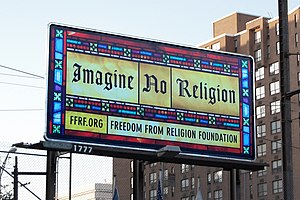| Freedom From Religion Foundation got this sign put up on busy 2nd Street in Harrisburg, PA. (Photo credit: Wikipedia) |
Secularism has long been one of Christian extremists' favorite boogeymen. They use it to fuel the myth that Christianity is under attack in the United States. At one time or another, they have sought to blame nearly every social ill on secularism. In doing so, they present a distorted picture of secularism, demonized secularists, and neglected to mention that secularism is beneficial to religion and to religious believers.
If those of us who value secularism are going to be able to stand up against those who would attack it, we must make sure that we understand it and that we are consistent in how we speak and write about it. Only then will we be able to provide an effective counter to the misinformation and propaganda that fuels much of the hatred aimed at those of us who defend the separation of church and state.
Religion News Service (RNS) recently reported on a conference at Georgetown University that focused on secularism.
The goal of the conference, called “Secularism on the Edge,” was, in part, to define what secularism is and what it is not. It drew participants from France, Israel and the United States — all countries with strong secular and religious strains.This sounds like a fascinating conference and one which would have been nice to see a couple decades ago. Still, I say better late than never. As RNS correctly points out, secularism is poorly understood and frequently attacked based on an inaccurate understanding.
What is Secularism?
I want to acknowledge that I have not always used the terms "secularism" and "secular" correctly. I think I have on occasion fallen into the trap of using these terms as a shorthand way to characterize the reality-based community. That was a mistake on my part, because that is not at all what these terms mean. I pledge to be more precise in my terminology going forward.
So what is secularism, and what does secular mean? I have often thought that the best way to understand secularism is to view it as the position which advocates government neutrality on matters of religion. A secular government is one which prefers no religion over another. In fact, a secular government does not prefer religion over non-religion (or non-religion over religion). When it comes to religion, a secular government is neutral.
Secularism is not synonymous with atheism, and it is not opposed to religion. Religious believers can be proponents of secularism too. Those religious believers who recognize the value of keeping government out of religion often do join with non-believers in advocating for secularism and separation of church and state.“
(Secularism) is a guarantee of two things: freedom of religion and freedom from religion,” said Jacques Berlinerblau, a Georgetown professor, conference organizer, and author of “How to be Secular.”The balance that Prof. Berlinerblau refers to here is essential to understanding secularism. A secular government does not promote atheism any more than it promotes religion. It is not an atheistic government but a neutral one.
“In a perfect world, it balances the citizen’s need of those two fundamental rights.”
The Value of Secularism
A secular government is good for religion and for religious believers because it protects religious freedom. A secular government does not meddle in matters of religion, giving one particular form of religion preferred status over the rest. All religions are treated equally by the government, and none are valued over others. This means that individuals are free to practice their religion as they see fit without government interference. The Christian family does not have to worry about their children being subjected to Muslim prayers at school and vice-versa.
A secular government is also good for the non-religious because it protects freedom from religion, refusing to push any form of religion on people. Not only is no one particular form of religion given preferred status but religious belief itself is not preferred over non-belief by the government. Nonbelievers are free to live their lives without government pressure to embrace even a generic religion.
Those who fight against secularism are either horribly mistaken about its meaning or oppose true religious freedom. After all, true religious freedom is not possible without freedom from religion. As secularism shows us, we cannot have one without the other.
